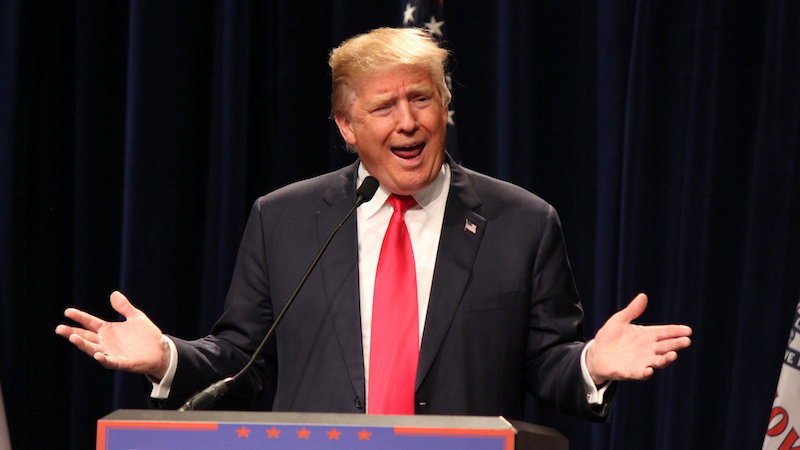As negotiators at the latest UN climate conference in Bonn ground through procedural matters inside the plenary, the media was only interested in one thing: Agenda Item Trump.
US president Donald Trump has vowed to remove his country from the Paris climate agreement. But a rearguard action from his advisors has raised the prospect of the US remaining.
Energy secretary Rick Perry has said the US should “renegotiate” the deal – widely interpreted to mean a downward revision of its national target. But legal advisors to Trump reportedly warned of potential legal action against the federal government if it tries to water down commitments.
A schism has emerged among defenders of the Paris Agreement over how to respond. In an attempt to defuse the legal argument last week, the EU commissioner on climate change Miguel Arias Cañete told the Financial Times the US could “chart its own path” under the rules of the accord.
French diplomat Laurence Tubiana, a key architect of the Paris accord, in contrast emphasised its intention to ramp up ambition over time and the political cost of backtracking.
“The sense of the direction is really progress; it’s not going backwards,” Tubiana told E&E News. Later she said on Twitter: “Yes US can legally downsize [its climate commitments] as Contributions numbers are not legally binding. But politically should not.”
Weekly briefing: Sign up for your essential climate news update
That has left those at the Bonn climate meeting, which started on Monday, scrambling for an answer. Negotiators and environmentalists at the talks privately told Climate Home there was confusion around a message.
Cañete’s position is technically correct, according to legal experts. The text does give room for what negotiators refer to as “backsliding”. But the wider political context is summed up by the phrase “the spirit of the agreement”.
The concern, touched on by Tubiana, is that allowing the US to reduce their ambition would undermine a fundamental tenet of the agreement. Countries need to do more, not less, if their contributions are ever to add up to the overarching goal of holding global temperature rise “well below 2C”.
At a press conference on Monday, representatives of the UN Framework Convention on Climate Change (UNFCCC) had a bet each way.
UN climate chief Patricia Espinosa told reporters the climate process would be able to accommodate a US administration that wanted to reduce its ambition.
“The spirit and the objective of the Paris agreement really requires that countries try to higher [sic] their ambition over time,” she said. “Having said that, of course it is important to acknowledge that parties may at different moments face some specific questions they may need to address.”
Report: China warns Trump: leaving Paris accord risks bad deals at G7, G20
The president of the 2016 Marrakech climate talks, Moroccan foreign minister Salaheddine Mezouar, said in an opening address that “the international community has become aware of the irreversibility of the commitments [to the Paris agreement]”.
When asked whether that meant he disagreed with Cañete, he said going against the will of the international community for increased ambition would be “difficult or futile” but he added that the “approach can be different” – a nod to Cañete’s concession that the US could choose the manner in which it tackles greenhouse gas emissions.
Different “paths” and “approaches” implies that all countries will eventually increase their ambition to the point where the global temperature rise is contained within 2C, but that they are free to choose how they arrive there. Trump has given no indication that a safe climate is his long-term intention for US policy.
NGOs were mostly silent on the issue, apparently split over how to respond. At an earlier press conference, Brandon Wu policy and campaign director at ActionAid US, said: “If the US wants to come in and say, well actually we’ll stay in the Paris agreement but we want to make sure that it is an option for all countries to reduce their commitments, that would be a problem.”
He added that allowing countries to cut their commitments without consequence “that essentially means that the Paris agreement will not be able to reach its stated goal”.
But when asked about the effect of a major player like the EU appearing to concede that was, in fact, the case, Wu said: “I would not concede that that precedent has been set.”
